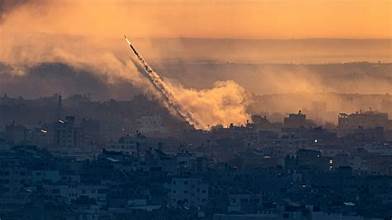
Pakistan’s Leader Vows Retaliation After India’s “Act of War” in Kashmir Conflict
Dubai | May 7, 2025 | 12 | India , news , Pakistan , WarTensions between nuclear-armed neighbors India and Pakistan surged on Wednesday after Indian missile strikes hit multiple locations in Pakistan-administered Kashmir and eastern Punjab, killing at least 26 people, including women and a child. Pakistan’s Prime Minister Shehbaz Sharif condemned the strikes, calling them an “act of war” and vowing a strong retaliation.
India stated the missile operation targeted militant infrastructure linked to last month’s deadly attack on Hindu tourists in Indian-administered Kashmir, where 26 people were killed. Pakistan denies any involvement in that attack.
In response, Pakistan’s military claimed to have shot down five Indian Air Force jets. Debris from downed aircraft was found across several villages in Indian-controlled Kashmir, with at least seven civilians killed by Pakistani shelling.
India’s Airstrike Operation: “Sindoor”
India’s military dubbed the operation “Sindoor,” symbolizing the red vermillion powder worn by married Hindu women, in memory of those whose husbands were killed. The Indian Defense Ministry said the strikes were focused and avoided targeting Pakistani military assets, emphasizing the action was “measured and non-escalatory.”
However, Pakistan reported missiles struck six locations, including a mosque in Bahawalpur where 13 people, including a child, died. The area is known to have been linked to banned militant groups like Jaish-e-Mohammed. Group leader Masood Azhar alleged that 10 of his relatives and four aides were among the dead.
Another strike hit a mosque in Muridke, previously tied to Lashkar-e-Taiba, the group believed to be behind the recent tourist massacre, now operating under the alias Kashmir Resistance.
Civilian Toll and International Concern
Witnesses described panic as explosions rocked neighborhoods and villages near the Line of Control. In Indian-administered Kashmir’s Poonch district, at least seven civilians were killed and over 30 injured due to retaliatory Pakistani shelling. Indian authorities accused Pakistani troops of unprovoked artillery fire.
In a show of readiness, several Indian states conducted rare civil defense drills, preparing civilians for potential further hostilities. Indian leaders, including Defense Minister Rajnath Singh and Congress President Mallikarjun Kharge, praised the military’s resolve.
U.S., China Call for Restraint
The U.S. diplomatic mission in Pakistan issued a security alert, urging American citizens to avoid conflict areas and warning of canceled flights as Pakistani airspace temporarily closed. Airports in Islamabad, Lahore, and Karachi later resumed operations.
President Donald Trump commented from the White House, calling the violence “a shame” and hoping for a quick resolution.
China, a key economic partner of Pakistan, expressed regret over the strikes and urged both nations to exercise restraint. A spokesperson from China’s Ministry of Foreign Affairs emphasized the importance of peace and stability in the region.
Escalation Risks Grow
Experts warn that this is one of the most serious military escalations between India and Pakistan in years. South Asia analyst Michael Kugelman noted that both countries have strong militaries and a history of conventional conflict despite nuclear deterrents. The potential for further escalation remains high.
UN Secretary-General Antonio Guterres also urged both nations to show “maximum restraint,” warning that the global community cannot afford another military crisis between India and Pakistan.


